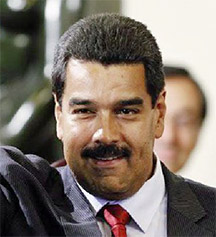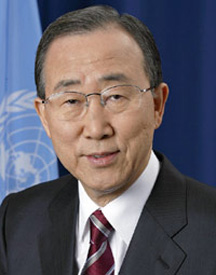President Nicolas Maduro has written to the United Nations asking for the appointment of a Good Officer to solve the border controversy with Guyana.
This is according to the online version of the Venezuelan daily El Universal which reported on Friday that UN Secretary General Ban Ki-moon in addition to receiving a letter, had a telephone conversation about the issue with Maduro.


It was stated that the Secretary General “took note” of the position of Venezuela in the border controversy between that country and Guyana and said he was in contact with both governments.
Guyana has already indicated that it was seeking a judicial settlement of the controversy and was not amenable to a return to the Good Offices process.
The last Good Officer was Norman Girvan, who died in April 2014 and was not replaced.
According to El Universal, the UN head last Friday met with Venezuelan Foreign Minister Delcy Rodriguez, who gave him Maduro’s letter asking for the appointment of a UN Good Officer in the matter of the border controversy with Guyana. It was stated that Ban took note of the foreign minister’s views.
Ban “acknowledged receipt of the letter from the president [Maduro] on the border dispute [sic] between Guyana and Venezuela and reaffirmed the willingness of the UN Secretariat to discuss a way forward with the two governments,” a UN press office release said.
The statement did not anticipate what the UN’s reply to Venezuela’s request for the appointment of a Good Officer would be, El Universal reported.
In his maiden foreign policy statement to the first sitting of Guyana’s 11th Parliament, Foreign Minister Carl Greenidge confirmed that Guyana for its part was preparing to look outside the UN Good Officer process and examine other options for solving the border controversy available under the Geneva Agreement of 1966.
He told the House that for the more than 25 years the Good Offices Process had been in operation, it had signally failed to resolve the issue, and that a juridical settlement in respect of Venezuela’s contention that the 1899 Award was null and void was the best way to proceed.
Venezuelan decrees
On May 26 President Maduro issued a decree which claimed waters off Guyana’s Essequibo coast in violation of international law and the 1966 Geneva Agreement which sets out the basis for finding a solution to the border controversy between the two countries. Just days before the decree, ExxonMobil had announced that it had found what appeared to be significant oil deposits in the waters off Demerara.
Then on July 6 Caracas issued a new decree in the wake of vocal criticism of the May 26 decree from Guyana and Colombia in particular. That decree while omitting co-ordinates created defence zones which included Essequibo waters and which Venezuela could patrol.
WPA criticizes Caricom statement
Meanwhile the Working People’s Alliance (WPA) in a press release said it was surprised that both President David Granger and Greenidge, after their return from the recently concluded Caricom Heads of Government meeting in Barbados expressed satisfaction with the statement made on the decree.
“The Statement was extremely terse, as though the Heads would rather be rid of the problem (which might have been the position of Dominica, Haiti, Jamaica and St Vincent who have especially benefited from the Venezuelan connection),” the party said before pointing out that the statement refers specifically to Guyana in only two paragraphs.
WPA said that on reflection, “it is not surprising that a watered down Statement would have emerged out of the Caricom Conference, given the PetroCaribe and other economic relations with Venezuela.” It stated that Guyana should have employed a strategy to argue for two separate, but related statements – one dealing with Caricom as a whole and another specifically related to Guyana.
There are a few robust declarations that our Guyana negotiators should have struggled for and challenged the other member states to include in any Caricom Statement on the Guyana situation, the party said.
According to the press release Guyana should have pressed Caricom to include in their statement, a call on Venezuela to recognize and adhere to the binding1899 Arbitral Award which committed the respective parties to a “Full, Perfect and Final” settlement; a call on Venezuela to recognize Guyana’s sovereignty and territorial integrity and not to encroach on same; a call on Venezuela to desist from making military threats against Guyana; a call on Venezuela to desist from taking physical action or making verbal utterances that scare investors and harm Guyana’s ability to exploit the resources of the Essequibo region; and a call on Venezuela to cease all other actions and declarations that are tantamount to the destabilization of Guyana.
According to the party Venezuela’s withdrawal of the 1787 Decree, and its replacement by the “equally obnoxious” 1859 Decree requires Caricom and all other supporters of the Guyana cause to immediately make another Statement, “this time harshly condemning Venezuela’s action.”





